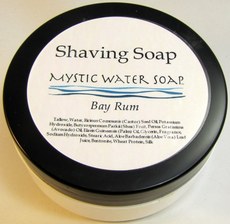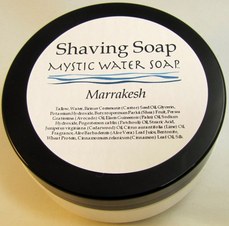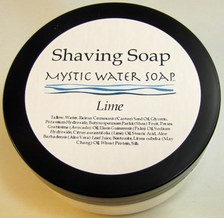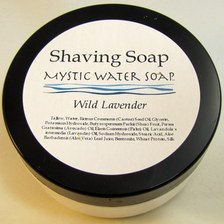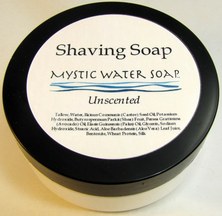Shaving Soap FAQ.
Here are answers to a few commonly asked questions. However, if you still have questions, please feel free to either contact me at [email protected] or call (240) 396-6831) and I will do my best to answer your questions!
--Michelle Burns, soap artisan What are the ingredients in your shaving soap?My shaving soap is made in small batches using beef tallow, organic unrefined shea nut butter, sustainably harvested organic palm oil, castor seed oil, avocado oil and stearic acid along with extra glycerin, bentonite clay, aloe vera leaf juice, allantoin, and dissolved silk. The oils are saponified with both sodium and potassium hydroxide to make a semi-soft soap that is the consistency of modelling clay: neither hard nor soft.
Some soaps might contain goat milk, beer, coconut milk, or other types of clay and all ingredients are listed on the soap label. It is not a vegetarian product (but my bath/facial/salt/shampoo soaps are all vegetarian or vegan). Is your soap made with essential oils or fragrances?
I use both high quality fragrance oils that have been tested by the manufacturer to be skin safe for cosmetic use, as well as botanical essential oils. Essential oils are distilled or pressed from leaves, flowers, roots, rind, or wood of aromatic plants. Some of these oils have specific therapeutic use, others are prized primarily for their scent. While I prefer to use essential oils where possible, some essential oils come from plants that are relatively rare or the oil is expensive to produce; in those cases I use a fragrance oil substitute. Other scents are not available in nature and a fragrance oil is the only way to be able to offer that scent.
Is your soap good for sensitive skin and people with allergies?
I formulated this soap without coconut oil so that it would be very gentle and non-drying. If you have allergies to fragrances, the unscented Sensitive Skin soap might be the best one to try first. However, you should always check the ingredients of any new product to make sure there is nothing to which you are allergic. Some of the oils may be produced in facilities that also process nuts so I can’t guarantee that there might not be traces of peanut or other nut oils – please do a patch test if in doubt.
I’ve heard that lye is bad for you. Is there lye in your soap?All soap is made with lye, even the so-called "glycerin" soaps. The fact is, all soap is made with sodium hydroxide and/or potassium hydroxide, which are both known as "lye". Even melt & pour “glycerin soaps” are made with lye at their origin. Without lye, oils cannot become soap and glycerin is just a sticky liquid. BUT, there's no lye left in the finished soap: the oils and lye have been transformed into soap and moisturizing glycerin.
How much does your soap weigh and how is it packaged?
The soap is molded into 3” diameter pucks that weigh between 4 and 4.5 ounces each. They are enclosed in food-grade shrink-wrap, labeled, and sold either as refills or in a 4" diameter, thick-walled, white plastic tub with a waterproof label. Shave sticks are translucent screw-up plastic tubes that hold about two ounces of soap.
Is your soap triple-milled?No, it is not a hard triple-milled soap; it's a semi-soft soap with the consistency of modelling clay. Hand-made artisan soap like mine cannot be milled because of the large amount of natural glycerin that it contains. Triple-milling is a mechanical process used in factories where dry soap base is ground and mixed with fragrance and other ingredients, before being pressed into shapes.
Is your soap a glycerin soap?My soap is not a melt-and-pour glycerin soap: a purchased soap base that is melted, scented and poured into molds. Mystic Water soap is made the old-fashioned way from scratch, in small batches, from an original formula. Glycerin is produced as a natural by-product of the chemical reaction between oils and lye, and we add extra vegetable glycerin to make your lather even more moisturizing. So in that sense, Mystic Water is also a “glycerin” soap, but better.
What kind of brush works best?
|
